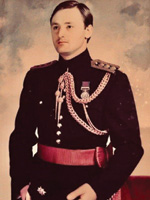|
Captain Henry Buckmaster
Late Irish Guards
by Lieutenant Colonel Brian O’Gorman DL
formerly Irish Guards
|
 Henry Buckmaster died on 23rd August 2019 aged 64, after a brave fight against cancer. Henry, ‘Heinrich’ or ‘Bucko’ as he was known, was a very special Irish Guardsman who gave so much more in life than he received. Over 700 people, of all ages, attended his memorial Service in the Guards’ Chapel in December which was an indication of how much he meant to everyone. Henry Buckmaster died on 23rd August 2019 aged 64, after a brave fight against cancer. Henry, ‘Heinrich’ or ‘Bucko’ as he was known, was a very special Irish Guardsman who gave so much more in life than he received. Over 700 people, of all ages, attended his memorial Service in the Guards’ Chapel in December which was an indication of how much he meant to everyone.
Although he completed only six years of military service, it was a formative experience that he never regretted and he retained the friendships he made in the Regiment throughout his life. He loved the Micks and was Vice Chairman of the London Branch of the Irish Guards Association for many years.
After leaving Ampleforth College in 1973 his career leaning was towards chartered accountancy which he admitted would have been ‘a bit of a slog’. After a summer in Sardinia and winter in Fortnum & Mason in Piccadilly he opted for the Army and joined a Brigade Squad for potential officers at the Guards Depot in Pirbright in 1974. He progressed on to Mons and was commissioned into the Regiment on 8th March 1975 on a Short Service Commission.
For his first two years he was a platoon commander and company second-in-command of No 1 Company in Münster, part of BAOR, in West Germany. He was an immediate success; conscientious, sociable, meticulous and well respected by everyone. The Guardsmen and NCOs trusted him because they knew he always had their interests at heart. He deployed to Canada on a ‘Medicine Man’ exercise. His then Combat Team Commander recalls having to, not so politely, ask him to stay off the radio net so that he could conduct the battle on the ground. He was a great enthusiast and was so excited giving a running commentary of the battle in progress, encouraging some, chastising others, perhaps too enthusiastically.
In 1977 the Regiment formed a platoon of Junior Guardsmen at the Royal Irish Depot in Ballymena to improve the Regiment’s recruiting and Henry was posted there for 9 months as the Platoon Commander. The Royal Irish Commandant rated him the best subaltern under his command at the time. He was, he said, highly professional, extrovert with enormous humour and charm, gaining the respect of all ranks, an excellent officer by any standards. I was serving in Northern Ireland years later and he was still spoken of in almost reverential terms and I was constantly asked ‘How’s Henry?’
Henry returned to Münster as a company second-in-command. The key to Henry’s personality, and one of the reasons why he was so popular, was that he always thought of other people first and put their concerns before his own. He was empathetic and without a trace of self-importance. His enthusiasm for soldiering, skiing, backgammon, ‘billiards 5s’ and field sports made him excellent company, a true and faithful friend, and a great Mick.
The following year, 1978, he was selected to be Aide-de-Camp to the Corps Commander in Bielefeld. He was an ideal choice. Efficient and warm hearted, it was a lesson to observe him working a room making everyone’s day that much better. Ever the party person, and with his General away, he hosted a not so discreet lunch for the five ADCs in Germany at the time. A passing staff officer questioned why five light helicopters were parked on the lawn and was worried that there must be a crisis of which he was not aware. Henry charmed his way out of it. He later organised another gathering in Berlin to, in his words, ‘get as many Aides as possible away from their Generals and to have a thoroughly good ‘swan’’. The ‘swan’ included a trip into East Berlin dressed in mess kit. It was deemed a great success although another Mick officer, serving in BRIXMIS at the time, saved the day after too many over exuberant misdemeanours.
The Battalion was presented with New Colours in Windsor Castle in 1978 and all ‘extra regimentally employed’ officers were recalled to be ushers at the event. A group photograph of the 11 ushers was taken which was distributed around the world and even featured in glossy American magazines. 10 ushers were smiling but Henry was doubled-up with laughter. He could never remember what the joke was.
Henry was an excellent candidate for a Regular Commission but he was not tempted and he left the Army in 1981. He went on to have a very successful career in financial services in the City of London.
Without doubt his greatest joy was his family, his wife Julia and his girls, Rose, Camelia and Lily and it is a great sadness that they lost Henry so young. He would have been a wonderful grandfather.
We are privileged to have known him. He was, as the Guardsmen say, a ‘proper Mick.’
Quis Separabit
|
|